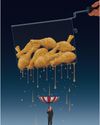
It is integral for the management and supply of perishable goods. However, certain commodities are extremely temperature sensitive, and that’s where cold chain supply comes into play. CC refers to the temperature-controlled supply chain that is specifically designed to maintain and preserve the quality of temperature-sensitive products such as fruits and vegetables, meat and fish, dairy products, and healthcare products. The supply chain encapsulates the transportation, storage, and handling of such goods in a temperature-controlled environment.
THE NEED FOR COLD CHAINS IN INDIA With eight states located on the Tropic of Cancer, India lies on a latitude where the Sun is directly overhead. Between 1901 and 2018, the country’s average temperature rose by 0.7 degree Celsius and is expected to keep on rising. India Meteorological Department reported that in April 2023, the average maximum temperature hit 34.19 ºC. India is the world’s largest producer of milk, second largest for fruits and vegetables and contributes a good number in the production of marine, meat and poultry products. Food and Agricultural Organisation (FAO) reported that a rough 40 per cent of food produced in India is wasted annually due to fragmented food and inefficient supply chain system, and about 29% of vaccines go waste due to damages and temperature variations during transit.
THE TEMPERATURE LEVELS- The standard temperature for a cold chain ranges between minus 30 degree Celsius and 15 degree Celsius, depending on the products. It is typically categorized into five: Deep freeze (-25 to -30 Celsius), Frozen (-10 to -20 Celsius), Chill (2 to 4 Celsius), Pharmaceutical (2 to 8 Celsius), and Banana (12 to 14 Celsius).
Esta historia es de la edición June - July 2023 de Entrepreneur magazine.
Comience su prueba gratuita de Magzter GOLD de 7 días para acceder a miles de historias premium seleccionadas y a más de 9,000 revistas y periódicos.
Ya eres suscriptor ? Conectar
Esta historia es de la edición June - July 2023 de Entrepreneur magazine.
Comience su prueba gratuita de Magzter GOLD de 7 días para acceder a miles de historias premium seleccionadas y a más de 9,000 revistas y periódicos.
Ya eres suscriptor? Conectar

Chords of Success
For Saahil Goel, the deep-rooted passion for playing the guitar dates back to his high school days. Influenced by legends like Pink Floyd, Led Zeppelin, and the Pakistani band Strings, his musical journey mirrors his leadership style-balancing focus, discipline, and a collaborative spirit. Goel feels that playing guitar has enhanced his ability to balance focus and teamwork as a founder of an eCommerce shipping start-up.

IS YOUR RENT TOO DAMN HIGH?
Many small business owners struggle with their rents. Here's what to do.

HOW TO BOUNCE BACK FROM A BAD REVIEW
A one-star review can hurt your ego - and your business. But it's possible to prevent (and remedy!) this scary scenario.

HOW TO HIRE FOR THE FUTURE
Small businesses are struggling to find quality labor. So flip the conversation: Show workers how your business will set them up for opportunity.

You Can Hire Like Netflix
The streaming platform built an incredible team with a strategy called “talent density.” But you don’t need to be a tech giant to do it.

Speedy Growth Killed My Startup
We seemed to be rocking it - lots of press, major partnerships. Then we learned the harsh consequences of overlooking our customers.

Three Pivots to $100 Million
How do you find a working business model? Do it like Rowan-a brand that reinvented itself many times before finally piercing the ear-piercing market.

What Goals Actually Matter?
Some benchmarks are more important than others so what should you really care about? We asked six founders for their hardest-won lessons.

'Only the Strongest Are Going to Survive'
Brian Lee cofounded companies like LegalZoom and ShoeDazzle-and he believes a lot of conventional business wisdom is backward. Sure, it's harder to raise capital. But it's actually cheaper than ever to start a company.

HOW TRUST SAVED KFC
The former CEO of Yum! Brands explains how he turned around a struggling KFC-and the important lesson it offers for anyone in franchising.